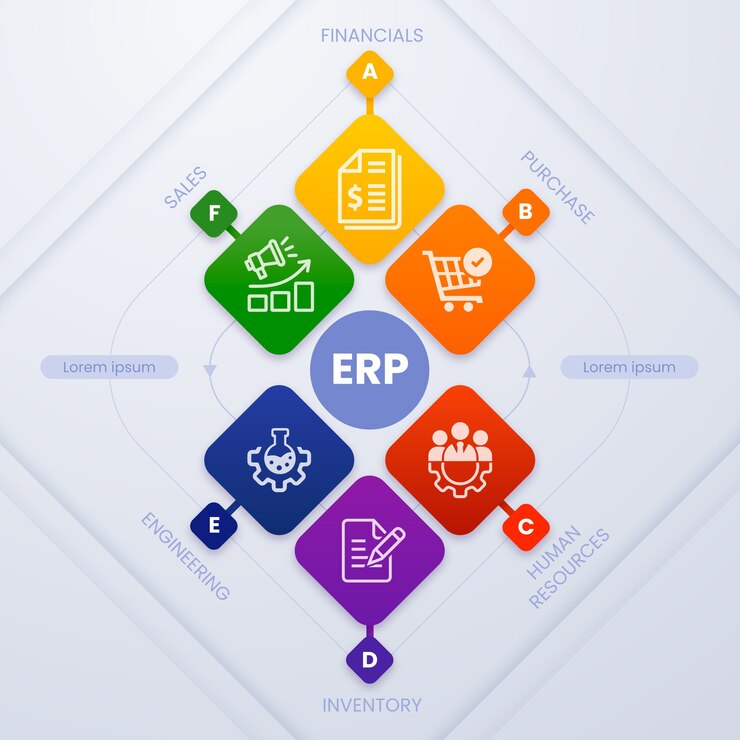Introduction
Dubai’s rapid economic expansion demands cutting-edge business solutions. An ERP system has become essential for companies aiming to streamline operations, ensure compliance, and maintain competitiveness in the UAE’s dynamic market.
This guide explains:
✔ What is an ERP system and how it works
✔ Why Dubai businesses must adopt ERP solutions
✔ Top ERP platforms available in the UAE
✔ Key implementation strategies
What Is an ERP System?
An Enterprise Resource Planning (ERP) system is integrated software that manages core business processes in real-time, including:
-
Finance & Accounting
-
Inventory & Supply Chain
-
Human Resources
-
Customer Relationship Management (CRM)
-
Project Management
By centralizing data, ERP eliminates silos, reduces errors, and provides actionable insights.
How ERP Systems Work
-
Data Integration – Connects all departments on one platform
-
Process Automation – Reduces manual tasks
-
Real-Time Analytics – Offers instant business intelligence
Why Dubai Businesses Need an ERP System
1. Compliance with UAE Regulations
-
Automates VAT calculations and reporting
-
Ensures WPS (Wage Protection System) compliance
-
Adheres to Dubai’s strict business laws
2. Supports Multi-Currency & Global Operations
-
Handles AED, USD, EUR transactions
-
Manages international suppliers and clients
-
Simplifies cross-border financial reporting
3. Enhances Operational Efficiency
-
Reduces manual work by 40-60%
-
Cuts operational costs by 20-30%
-
Improves decision-making with real-time data
Key Features of the Best ERP System in Dubai
1. Cloud-Based Accessibility
-
Accessible from anywhere, anytime
-
Secure data storage with automatic backups
-
Scalable for business growth
2. Arabic Language & Local Support
-
Bilingual interfaces (English & Arabic)
-
UAE-based customer service
-
Compliance with Dubai’s tax laws
3. AI & Automation
-
Predictive analytics for inventory
-
Chatbots for customer support
-
Smart financial forecasting
4. Industry-Specific Solutions
-
Retail: POS integration, stock management
-
Construction: Project costing, contractor management
-
Healthcare: Patient records, billing automation
Top 5 ERP Systems in Dubai
1. SAP S/4HANA
✅ Best for: Large enterprises
✅ Key Features: AI-driven insights, global compliance
✅ Pricing: Custom (starts at ~AED 100,000/year)
2. Oracle NetSuite
✅ Best for: SMEs & startups
✅ Key Features: Cloud-based, multi-currency support
✅ Pricing: From AED 800/month
3. Microsoft Dynamics 365
✅ Best for: Mid-sized businesses
✅ Key Features: Seamless Office 365 integration
✅ Pricing: Starts at AED 200/user/month
4. Odoo
✅ Best for: Customizable solutions
✅ Key Features: Open-source flexibility
✅ Pricing: Free community edition, paid from AED 120/month
5. Zoho ERP
✅ Best for: Cost-conscious businesses
✅ Key Features: Affordable, user-friendly
✅ Pricing: Starts at AED 80/user/month
How to Implement an ERP System in Dubai
1. Assess Business Needs
-
Identify pain points (e.g., inventory mismanagement)
-
Define must-have features (VAT automation, Arabic support)
2. Choose the Right Vendor
-
Check local compliance expertise
-
Evaluate scalability
-
Test customer support responsiveness
3. Data Migration & Training
-
Cleanse existing data before transfer
-
Train employees with role-based programs
-
Run pilot tests before full rollout
Future of ERP Systems in Dubai
1. AI & Machine Learning
-
Predictive maintenance for manufacturing
-
Automated fraud detection in finance
2. Blockchain Integration
-
Secure contract management
-
Tamper-proof audit logs
3. IoT-Enabled ERP
-
Smart warehouse tracking
-
Real-time equipment monitoring
Conclusion
An ERP system in Dubai is no longer optional—it’s a necessity for businesses aiming to thrive in the UAE’s competitive market. Whether you’re a startup or an enterprise, the right ERP solution can automate workflows, ensure compliance, and drive growth.
Key Takeaways:
✔ ERP centralizes business operations for efficiency
✔ Dubai’s regulations make local compliance features crucial
✔ Cloud-based, AI-powered ERP is the future
FAQs
1. What is the average cost of an ERP system in Dubai?
Basic systems start at AED 5,000/year, while enterprise solutions can exceed AED 200,000/year.
2. How long does ERP implementation take?
Typically 3-9 months, depending on business size and customization needs.
3. Can ERP software handle UAE VAT compliance?
Yes, top systems like SAP and Oracle automate VAT calculations and filing.
4. Is cloud ERP secure for sensitive data?
Reputable providers use bank-grade encryption, MFA, and regular audits for security.
5. Which ERP is best for small businesses in Dubai?
Zoho ERP and Odoo offer affordable, scalable options for SMEs.
